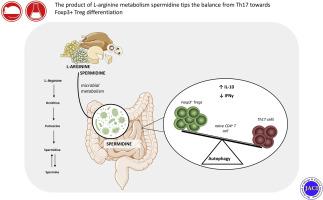Journal of Allergy and Clinical Immunology ( IF 11.4 ) Pub Date : 2020-05-11 , DOI: 10.1016/j.jaci.2020.04.037 Guilhermina M Carriche 1 , Luís Almeida 1 , Philipp Stüve 1 , Lis Velasquez 1 , Ayesha Dhillon-LaBrooy 1 , Urmi Roy 2 , Marc Lindenberg 3 , Till Strowig 4 , Carlos Plaza-Sirvent 5 , Ingo Schmitz 6 , Matthias Lochner 7 , Anna Katharina Simon 8 , Tim Sparwasser 1

|
Background
The cross-talk between the host and its microbiota plays a key role in the promotion of health. The production of metabolites such as polyamines by intestinal-resident bacteria is part of this symbiosis shaping host immunity. The polyamines putrescine, spermine, and spermidine are abundant within the gastrointestinal tract and might substantially contribute to gut immunity.
Objective
We aimed to characterize the polyamine spermidine as a modulator of T-cell differentiation and function.
Methods
Naive T cells were isolated from wild-type mice or cord blood from healthy donors and submitted to polarizing cytokines, with and without spermidine treatment, to evaluate CD4+ T-cell differentiation in vitro. Moreover, mice were subjected to oral supplementation of spermidine, or its precursor l-arginine, to assess the frequency and total numbers of regulatory T (Treg) cells in vivo.
Results
Spermidine modulates CD4+ T-cell differentiation in vitro, preferentially committing naive T cells to a regulatory phenotype. After spermidine treatment, activated T cells lacking the autophagy gene Atg5 fail to upregulate Foxp3 to the same extent as wild-type cells. These results indicate that spermidine's polarizing effect requires an intact autophagic machinery. Furthermore, dietary supplementation with spermidine promotes homeostatic differentiation of Treg cells within the gut and reduces pathology in a model of T-cell transfer-induced colitis.
Conclusion
Altogether, our results highlight the beneficial effects of spermidine, or l-arginine, on gut immunity by promoting Treg cell development.
中文翻译:

通过多胺亚精胺调节T细胞分化。
背景
宿主与其微生物群之间的串扰在促进健康中起关键作用。肠道内细菌产生的代谢产物(如多胺)是这种共生影响宿主免疫力的一部分。多胺腐胺,亚精胺和亚精胺在胃肠道中含量很高,可能会大大增强肠道免疫力。
目的
我们旨在表征聚胺亚精胺作为T细胞分化和功能的调节剂。
方法
从野生型小鼠或健康供体的脐带血中分离幼稚T细胞,并在接受和未接受亚精胺处理的情况下接受极化细胞因子的作用,以评估CD4 + T细胞的体外分化。此外,对小鼠进行亚精胺或其前体1-精氨酸的口服补充,以评估体内调节性T(Treg)细胞的频率和总数。
结果
亚精胺在体外调节CD4 + T细胞分化,优先将幼稚T细胞定型为调节表型。亚精胺处理后,缺乏自噬基因Atg5的活化T细胞无法将Foxp3上调至与野生型细胞相同的程度。这些结果表明亚精胺的极化作用需要完整的自噬机制。此外,在T细胞转移引起的结肠炎模型中,亚精胺的膳食补充剂可促进肠道内Treg细胞的稳态分化并减少病理。
结论
总之,我们的结果突出了亚精胺或1-精氨酸通过促进Treg细胞发育对肠道免疫的有益作用。











































 京公网安备 11010802027423号
京公网安备 11010802027423号